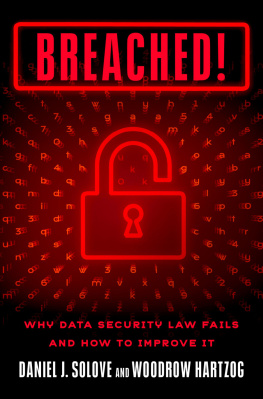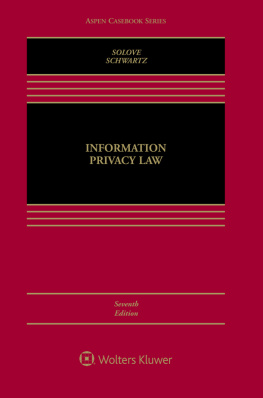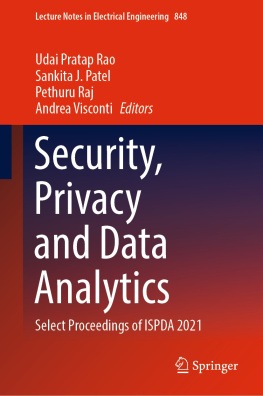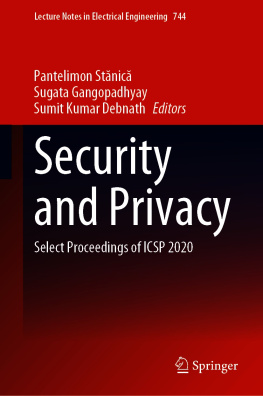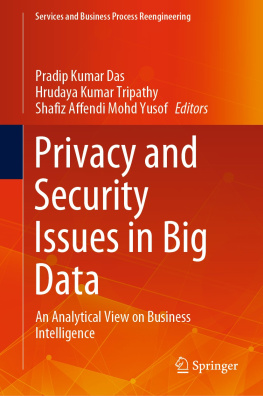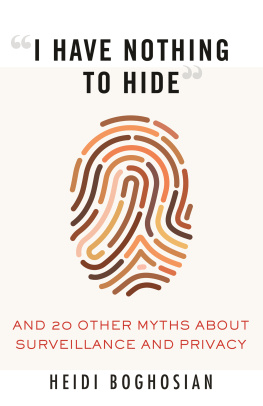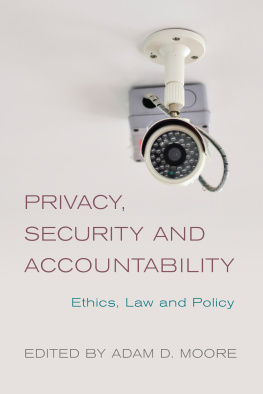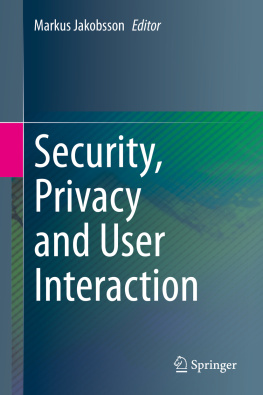Solove - Nothing to Hide The False Tradeoff between Privacy and Security
Here you can read online Solove - Nothing to Hide The False Tradeoff between Privacy and Security full text of the book (entire story) in english for free. Download pdf and epub, get meaning, cover and reviews about this ebook. City: USA, year: 2014;2011, publisher: Yale University Press, genre: Politics. Description of the work, (preface) as well as reviews are available. Best literature library LitArk.com created for fans of good reading and offers a wide selection of genres:
Romance novel
Science fiction
Adventure
Detective
Science
History
Home and family
Prose
Art
Politics
Computer
Non-fiction
Religion
Business
Children
Humor
Choose a favorite category and find really read worthwhile books. Enjoy immersion in the world of imagination, feel the emotions of the characters or learn something new for yourself, make an fascinating discovery.

Nothing to Hide The False Tradeoff between Privacy and Security: summary, description and annotation
We offer to read an annotation, description, summary or preface (depends on what the author of the book "Nothing to Hide The False Tradeoff between Privacy and Security" wrote himself). If you haven't found the necessary information about the book — write in the comments, we will try to find it.
Solove: author's other books
Who wrote Nothing to Hide The False Tradeoff between Privacy and Security? Find out the surname, the name of the author of the book and a list of all author's works by series.
Nothing to Hide The False Tradeoff between Privacy and Security — read online for free the complete book (whole text) full work
Below is the text of the book, divided by pages. System saving the place of the last page read, allows you to conveniently read the book "Nothing to Hide The False Tradeoff between Privacy and Security" online for free, without having to search again every time where you left off. Put a bookmark, and you can go to the page where you finished reading at any time.
Font size:
Interval:
Bookmark:
NOTHING TO HIDE
The False Tradeoff
between Privacy
and Security
DANIEL J. SOLOVE

To Pamela and Griffin, with love
Copyright 2011 by Daniel J. Solove.
All rights reserved.
This book may not be reproduced, in whole or in part, including illustrations,
in any form (beyond that copying permitted by Sections 107 and 108 of the U.S.
Copyright Law and except by reviewers for the public press), without written
permission from the publishers.
Yale University Press books may be purchased in quantity for educational, business,
or promotional use. For information, please e-mail sales.press@yale.edu (U.S. office)
or sales@yaleup.co.uk (U.K. office).
Set in Electra type by Integrated Publishing Solutions.
Printed in the United States of America.
Library of Congress Cataloging-in-Publication Data
Solove, Daniel J., 1972
Nothing to hide : the false tradeoff between privacy and security / Daniel J. Solove.
p. cm.
Includes bibliographical references and index.
ISBN 978-0-300-17231-7 (cloth : alk. paper) 1. Privacy, Right ofUnited
States. 2. Law enforcementUnited States 3. National securityLaw and
legislationUnited States I. Title.
KF1262.S65 2011
342.730858dc22 2010049542
A catalogue record for this book is available from the British Library.
This paper meets the requirements of ANSI/NISO Z39.481992 (Permanence of Paper).
10 9 8 7 6 5 4 3 2 1
PART I: Values: How We Should Assess and Balance
the Values of Privacy and Security
PART II: Times of Crisis: How the Law Should Address Matters
of National Security
8 The Problem with Dissolving the Crime-Espionage
Distinction
PART III: Constitutional Rights: How the Constitution
Should Protect Privacy
12 The Failure of Looking for a Reasonable
Expectation of Privacy
PART IV: New Technologies: How the Law Should Cope
with Changing Technology
17 The Law-and-Technology Problem and the
Leave-It-to-the-Legislature Argument
18 Video Surveillance and the No-Privacy-in-Public
Argument
20 The Luddite Argument, the Titanic Phenomenon,
and the Fix-a-Problem Strategy
The idea for this book began with an essay I wrote a few years ago called Ive Got Nothing to Hide and Other Misunderstandings of Privacy. After I posted it online, I was stunned by the attention it received across the Internet and in the media. I realized that there was a lot of interest in the debate between privacy and national security and that the same group of arguments came up again and again. I also realized that there were many misimpressions about the law.
Increasingly, Ive found it frustrating when I hear certain arguments in favor of heightened security that have become quite prevalent. I believe they have skewed the balance between privacy and security too much to the security side. One of my goals in this book is to respond to some of these arguments.
I have written this book for a general audience, avoiding legal jargon and wonky policy analysis. Ive presented more detailed policy proposals in my law review articles, but for this book, I focus on the general arguments and principles rather than technical minutiae. Of course, the details are important, but even more important are the basic concepts and themes of the debate. I hope that this book will put to rest certain arguments so that the debate can move ahead in more fruitful ways.
Although I have focused primarily on American law, the arguments and ideas in the debate are universal. Despite a few differences, the law in many countries operates similarly to American law, and it often uses the same techniques to regulate government information gathering. The arguments and policy recommendations I propose in this book are meant to be relevant not just in the United States but also in other nations whose lawmakers are struggling with these important issues.
Some of the material for this book was adapted from a few of my law review articles. These articles are much more extensive than their adaptations in this book, and they are often very different in form and argument. I have not fully incorporated these articles here, so they remain independent works. I recommend that you check them out if you want a more technical treatment of some of the issues in this book: Fourth Amendment Pragmatism, 51 Boston College Law Review (forthcoming); Data Mining and the Security-Liberty Debate, 74 University of Chicago Law Review 343 (2008); Ive Got Nothing to Hide and Other Misunderstandings of Privacy, 44 San Diego Law Review 745 (2007); The First Amendment as Criminal Procedure, 84 New York University Law Review 112 (2007); Fourth Amendment Codification and Professor Kerrs Misguided Call for Judicial Deference, 74 Fordham Law Review 747 (2005); Melvilles Billy Budd and Security in Times of Crisis, 26 Cardozo Law Review 2443 (2005); Reconstructing Electronic Surveillance Law, 72 George Washington Law Review 1264 (2004). My thinking has evolved since the publication of many of these articles, so this book represents my most current view of the issues. Moreover, writing this book forced me to think more broadly about the topic of privacy versus security, and there are many issues I address here that I havent addressed before.
Many people helped me greatly with this project. My wife, Pamela, provided constant support and encouragement as well as superb suggestions on the manuscript. Many others have made immensely helpful comments on this book: Danielle Citron, Tommy Crocker, Deven Desai, Chris Hoofnagle, Orin Kerr, Raymond Ku, Paul Ohm, Neil Richards, and Michael Sullivan. I would also like to thank my research assistant, Matthew Albanese, for his help. My editor, Michael OMalley, was a joy to work with, and my copyeditor, Dan Heaton, carefully reviewed the manuscript. My agent, Susan Schulman, provided excellent guidance and encouragement throughout the publication process.
We must be willing to give up some privacy if it makes
us more secure.
If youve got nothing to hide, you shouldnt worry about
government surveillance.
We shouldnt second-guess security officials.
In national emergencies, rights must be cut back,
but theyll be restored later on.
We hear these arguments all the time. We hear them in the conversations we have each day with our family, friends, and colleagues. We hear them in the media, which is buzzing with stories about government information gathering, such as the Total Information Awareness program, the airline passenger screening program, and the surveillance of peoples phone calls conducted by the secretive National Security Agency. We hear them made by politicians and security officials. And we hear them made by judges deciding how to balance security measures with peoples constitutional rights.
These arguments are part of the debate between privacy and security. The consequences of the debate are enormous, for both privacy and security are essential interests, and the balance we strike between them affects the very foundations of our freedom and democracy. In contemporary timesespecially after the terrorist attacks on September 11, 2001the balance has shifted toward the security side of the scale. The government has been gathering more information about people and engaging in more surveillance. Technology is giving the government unprecedented tools for watching people and amassing information about themvideo surveillance, location tracking, data mining, wiretapping, bugging, thermal sensors, spy satellites, X-ray devices, and more. Its nearly impossible to live today without generating thousands of records about what we watch, read, buy, and doand the government has easy access to them.
Next pageFont size:
Interval:
Bookmark:
Similar books «Nothing to Hide The False Tradeoff between Privacy and Security»
Look at similar books to Nothing to Hide The False Tradeoff between Privacy and Security. We have selected literature similar in name and meaning in the hope of providing readers with more options to find new, interesting, not yet read works.
Discussion, reviews of the book Nothing to Hide The False Tradeoff between Privacy and Security and just readers' own opinions. Leave your comments, write what you think about the work, its meaning or the main characters. Specify what exactly you liked and what you didn't like, and why you think so.

